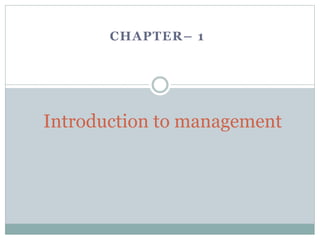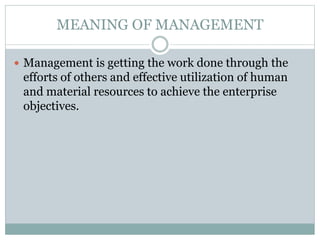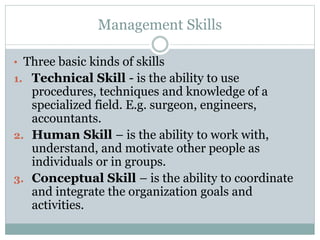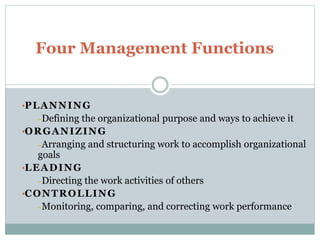Management.ppt
- 1. CHAPTERâ 1 Introduction to management
- 2. MEANING OF MANAGEMENT ï Management is getting the work done through the efforts of others and effective utilization of human and material resources to achieve the enterprise objectives.
- 3. The 4 Mâs of Management Manpower Management Money Materials Machinery
- 4. Difference between Management and Administration No . Administration Management 1 Administration is concerned mainly with determining goals to be achieved and policy working. Management is concerned mainly with implementation of policies. 2 Administration requires conceptual skills Management requires technical skills 3 Oriented more towards the external environment Oriented more towards the internal environment
- 5. Management Skills âĒ Three basic kinds of skills 1. Technical Skill - is the ability to use procedures, techniques and knowledge of a specialized field. E.g. surgeon, engineers, accountants. 2. Human Skill â is the ability to work with, understand, and motivate other people as individuals or in groups. 3. Conceptual Skill â is the ability to coordinate and integrate the organization goals and activities.
- 7. Managerial Objectives ï Efficient use of resources ï Customer Satisfaction ï Reasonable profits so as to give a fair return on capital invested in bussiness ï Survival and continuity of business ï Enhancing goodwill or reputation of the enterprise
- 8. âĒPLANNING âDefining the organizational purpose and ways to achieve it âĒORGANIZING âArranging and structuring work to accomplish organizational goals âĒLEADING âDirecting the work activities of others âĒCONTROLLING âMonitoring, comparing, and correcting work performance Four Management Functions
- 9. Meaning and Definition of Business ï Business is exchange (buying and selling) of goods ( like furniture, refrigerator etc. )and services ( Transport ,warehousing etc) for making profit. ï Business uses 4Ms â Money, Manpower, Machinery, Material. ï Business involved risk (like changes inâ consumer tastes, technology, Government policies). ï Profit is the reward for risk-taking. ï The people who consume ( or buy) goods and services are called consumers.
- 10. Essentials of Good Business ïž Well defined goals or objectives ïž Proper planning procedure with up-to-date information ïž Proper location so as to ensure low cost and high profits ïž Flexible and adaptive management ïž Sound organizational structure ïž Customer-focused marketing system ïž Sound personnel policies
- 11. Manager ï Manager is a person who performs all the 5 functions of management, that is â planning, organising, staffing, directing (or leading) and controlling. âĒ Modern Manager has to perform all the 5 functions of management, that is â planning, organizing, staffing, directing (or leading) and controlling. âĒ But he is not an owner-manager but a hired one ( that means he does not owned the company, and he is doing a job of a manager for a salary in the company) Modern Manager
- 12. Business Environment 1. Economic Environment âĒ Capital (money, cash) âĒ Labour (manpower: availability, quality, and price) âĒ Price levels (Inflation) âĒ Government tax policies âĒ Customers (what customer want and willing to buy) âĒ Technology (high productivity, greater variety of goods) 2. Social Environment âĒ Attitudes, desires, expectations, beliefs, and customs of people âĒ Social responsibilities (of the business towards the society) âĒ Ethics (what is right and what is wrong)
- 13. 3. Political Environment âĒ Attitudes and actions of political and government leaders (may put some restrictions, or may promote business by providing financial assistance) 4. Legal Environment âĒ Law, regulations and court decisions (to protect consumers, workers, community) affects the business
- 15. ï Scientific Management is that kind of management through which business is conducted based on facts gained by systematic observation and experiment. ï The Managers should not stick to old ways but should try scientific tools and techniques, so that best results can be achieved. Scientific Management
- 16. ï There are many Management Experts who have developed various theories as follows: 1. BABBAGE : Specialization of Labour (when one worker do the same task or work again and again, it will lead to specialization of labour) 2. TAYLOR : Develop a science for each job with standardized and efficient methods. ï Select Skillful workers ï Incentives (prizes, bonus for the workers so that they contribute to their best to the organization) ï Dividing responsibilities History of Management
- 17. History of Management 4. GILBRETH: Rest pauses after 8 hours (workers take rest after eight hours) 5. GANTT: Work quota system (number of working hours differ from one employee to the other) Bonus ( for more work ,giving the worker financial reward i.e. more money) 6. FAYOL: He has developed 14 Principles of Management All managerial tasks are classified as Technical, Financial, Accounting 7. BARNARD: Organizational communication system (success comes where employees accept the authority of others)
- 18. 8. SIMON: He believed that a manager is an administrative man and not an economic man ( manager should lead, select, choose, decide and not only count profit and loss only) 9. OWEN: He was the first to speak about Human Resources ( he cares about the people and not machines) 10. MUNSTERBERG: He was the father of Industrial Psychology ( he studied the application of psychology in work) 11. MAYO: He studied the factors of satisfaction and dissatisfaction to the workers History of Management
- 19. 12. FOLLET: He believes in Group Work and Self Control (leads to share power and belief) 13. MASLOW: He believes that a manâs needs could be placed in âhierarchy of needsâ 14. McGREGOR: He cares about employee work relationship and he has developed Theory X and Theory Y (Theory X: Workers are lazy and donât want to work; Theory Y: Workers wants to work and are positive) 15. DRUCKER: He has developed MBO (Management By Objectives) and had contribute a lot in the field of management. History of Management


















